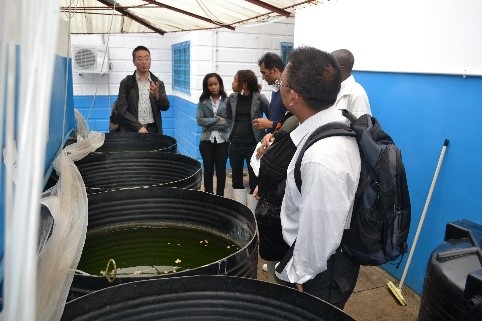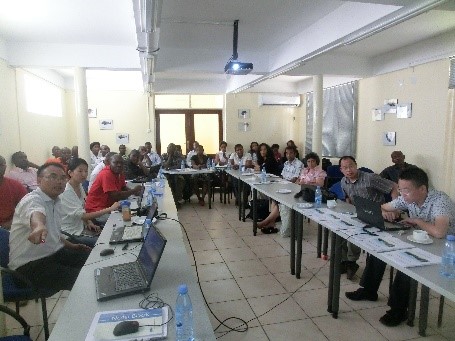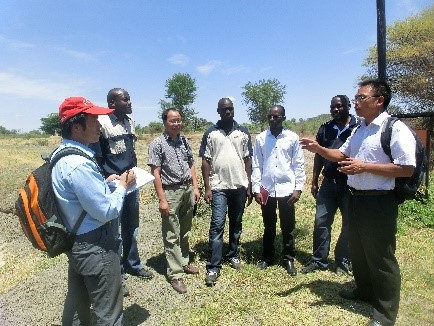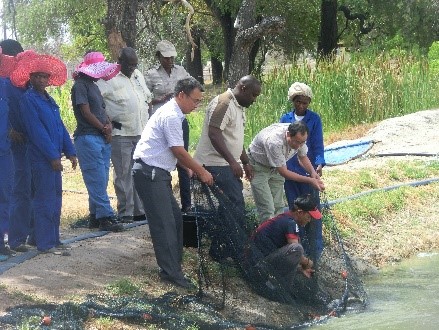 Technical Extension and Application of Sustainable Aquaculture in Mozambique and Namibia
Contributing to the sustainable development of local aquaculture through technical consultations and capacity-building for smallholders and technicians
Technical Extension and Application of Sustainable Aquaculture in Mozambique and Namibia
Contributing to the sustainable development of local aquaculture through technical consultations and capacity-building for smallholders and technicians

Challenges
Aquaculture plays an important role in providing employment, increasing income and ending poverty in some African countries. Mozambique and Namibia are rich with inland fishery resources and aquaculture. Aquaculture has been identified by the governments of both countries as a key industry for nutrition intake, food security and social progress. However, even though these countries have a large number of rivers, lakes, reservoirs, dams and streams and conducive climate conditions, the aquaculture industry has developed at a slow pace, with low production, limited quantities and high mortality of aquatic species. Some major constraints are lack of high-quality seed and feed, insufficient qualified and skilled human resources, poor aquaculture techniques, poor farm infrastructure and management, and lack of funding for aquaculture and related projects.
Towards a Solution
The Technical Extension and Application of Sustainable Aquaculture in Mozambique and Namibia project was implemented by the Freshwater Fisheries Research Center of the Chinese Academy of Fishery Sciences (FFRC) and the Department of Aquaculture of the Ministry of Fisheries and Marine Resources (MFMR) and the National Institute of Aquaculture Development (INAQUA) of Namibia and the Ministry of Fisheries of Mozambique. The project focused on making a valuable contribution to capacity building and sustainable industry development of the aquaculture sector in the two countries.
The project’s five objectives were:
- to increase understanding of the real needs of the two countries in aquaculture development;
- to improve knowledge of local fish farmers and technicians on scientific fish farming through on-site technical consultations and well-targeted and needs-based training and sharing of scientific methods and techniques with the farmers and other beneficiaries (who learned key technologies in scientific feeding, seed nursing, grow-out culture, hatchery and fish farm management, fish disease diagnosis and prevention, etc.);
- to increase the confidence of managerial authorities to strengthen support for aquaculture (China provided successful experiences and practices in aquaculture which could be largely referred to and even borrowed by the two countries);
- to facilitate Chinese fishery institutions and enterprises to cooperate with fishery institutions in the two countries to improve fishery facilities and develop feed, thus strengthening mutual cooperation and friendship; and
- to share with participants more funding channels for developing the fishery industry.
Focusing on the above objectives, FFRC, one of the partner institutions of the Global South-South Development Center Project, in partnership with the Department of Aquaculture of the MFMR of Namibia, INAQUA and the Ministry of Fisheries of Mozambique, carried out on-site technical extension, capacity-building training and consultations in the aquaculture sector in Mozambique and Namibia.
Five experts from FFRC China were appointed to conduct two-week technical missions in Mozambique and Namibia to assist local smallholders with aquaculture development through improved practices and management. The experts demonstrated how to apply aquaculture practices, e.g., water test kits, fish nets, dissolved oxygen (DO) meters, etc. They gave professional suggestions and guidance to farmers and managerial personnel based on the difficulties encountered, keeping in mind feasibility. Basic theory and practical techniques of sustainable aquaculture development were discussed via lectures together with lab works, demonstrations and field practice, following by a “training of the trainers” session.
A total of 46 trainees from Mozambique and 42 trainees from Namibia took part, including local fishery technicians, extension officials and fish farmers. A Memorandum of Understanding (MOU) was signed between FFRC and INAQUA and another between FFRC and MFMR covering training of fish farming communities, collaborative research and technical assistance. These priorities displayed how all parties recognized the need and possibilities for sustainable long-term cooperation. Additionally, upon request of local parties, the expert mission group helped make connections with some notable fishery enterprises in China, especially in fish feed, fishery machines and feed machines, and negotiations between interested parties in the two countries and those enterprises have been ongoing.
The project activities increased local smallholder incomes and supplies of animal protein, promote fishery industry development, and create job opportunities in Mozambique and Namibia. These outcomes are in line with SDG 1 (no poverty), SDG 2 (zero hunger) and SDG 8 (decent work and economic growth). The project also reduced marine fishery resources capture, contributing to the achievement of SDG 14 (life below water). The active participation and joint efforts of various fishery institutions, authorities and local smallholders contributed to achieving SDG 17 (partnerships for the goals).
After the successful implementation of the project, FFRC followed up with the beneficiaries to track the outcomes and impacts of the project. Positive results included fish farmers in Northwest Namibia who learned how to ferment raw manure to fertilize ponds saw their pond water quality improve and farmers and technicians applied feeding techniques and started to feed fish at a fixed time, fixed location and fixed quantity, which is effective for feed-saving and disease prevention.
This project taught farmers and technicians how to scientifically fish farm and solved some local challenges. Most of the key methods were mastered by the beneficiaries, gradually promoting local aquaculture industries via self-reliance and ensuring sustainability of the project. The project ultimately increased the knowledge and techniques of local smallholders and technicians, promoted the development of inland fish farming and improved livelihood levels.
Undoubtedly this successful initiative in South-South cooperation is a positive example for other developing countries, especially in Africa. It ultimately stimulated the fishery and aquaculture industries in Mozambique and Namibia, boosting food security in the countries, and thus helped with poverty alleviation in Africa. Through the successful demonstration and extension work, a cooperation bridge was built between these developing countries allowing deeper communications.
Contact Information
Countries involved
Supported by
Implementing Entities
Project Status
Project Period
Primary SDG
Primary SDG Targets
Secondary SDGs
Secondary SDG Targets
Similar Solutions
| NAME OF SOLUTION | Countries | SDG | Project Status | |
|---|---|---|---|---|
A Billion Brains: Smarter Children, Healthier Economies High Level Meeting on South-South Cooperation for Child Rights |
Mozambique, Namibia | 17 - Partnerships for the Goals | Completed | View Details |
Accelerator Labs Network Following collective intelligence methods to address emerging sustainability challenges and the growing demand for local solutions |
Mozambique, Namibia | 08 - Decent Work and Economic Growth 13 - Climate Action | Ongoing | View Details |
Accessibility of Financial Services and the Private Sector in Africa Maximizing the impact of financial cooperation on economic development and industrialization in Africa |
Mozambique, Namibia | 08 - Decent Work and Economic Growth | Completed | View Details |
Accessibility ToolKit Promoting accessibility as a cornerstone for inclusive digital development in Bangladesh. |
Mozambique, Namibia | 08 - Decent Work and Economic Growth | Completed | View Details |
ACP Business-friendly Supporting business-friendly and inclusive national and regional policies, and strengthening productive capabilities and value chains |
Mozambique, Namibia | 08 - Decent Work and Economic Growth 17 - Partnerships for the Goals | Ongoing | View Details |



